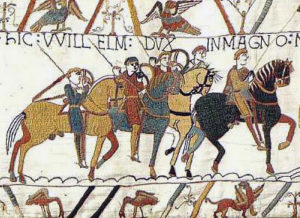
The Normans brought surnames to England
The study of genealogy mainly relies on the surname in order to follow a family line. However, in relation to the history of the United Kingdom, surnames have only been around for about 1000 years.
Before the Norman Conquest of 1066, surnames did not really exist. A person might be identified by where he came from, or what he looked like, so he might be known as Edmund of the red hair, or Godric from over the hill. So before 1066 names were not hereditary, making it impossible for the vast majority of people to trace a family history beyond this point, and for most people it would be difficult to trace beyond the 16th century as most documents using surnames do not really exist for anyone other than the very wealthy before this time.
After the Norman Conquest, William I’s barons were identified by their, or their family’s place of origin in France – so you would have names such as Robert de Beaumont or Hugh de Montfort. After time, the ‘de’ would be dropped, and the place of origin became a surname.
The fashion for surnames began in these top ranks of society, and only gradually filtered down through all levels of society. It was not until the Middle Ages that surnames had become generally adopted by everyone, partly due to the necessity for identification as documentation increased. In the lower classes, it was not just place names that were used.
If your surname sounds like a French place name, there is a possibility that you could be descended from a Norman baron.
Five Different Sources of Surnames
There are basically five different types of surname, and the source of your own surname will be from one of the following:
Place names
This is the most common surname root, and would have been developed from the place or area of residence of one of your distant ancestors. It could be the name of a place, such as Hill, Wood, Townsend, or descriptive, such as French. If your surname sounds like a French place name, there is a possibility that you could be descended from a Norman baron.
Occupations
This is also very common but not always obvious, as many old occupations have vanished into obscurity. Examples of the more obscure names are Lavender (washerwoman) and Dexter (dyer). Some of the more obvious ones are Farmer, Baker or Carpenter. Before surnames became hereditary at around 1400, these types of names might change from generation to generation.
Relationships
When a surname ends with the suffix, ‘son’, this indicates that an ancestor was named after the father. For example, Robertson means ‘son of Robert’. Some surnames that end with an ‘s’, such as Jones, also have the same origin. Occasionally, mother’s are remembered, as in ‘Annis’ (from Agnes) or Mudd (from Maud).
Nicknames
These types of surnames have derived from physical characteristics such as Redhead or Armstrong, or peculiarities, such as Cruikshank (meaning lame of leg). Long or Short are obvious family traits, and some surnames come from moral attributes such as Good or Gay (meaning happy in its old sense!)
Nature
A few surnames have their origins in animals (such as Bull), plants or fruits (Quince), perhaps because a person owned or grew them.
It is not always easy to know in which of the above categories your surname originated. My own surname, Bott, is a very old name and its meaning is not obvious. However, it may originate from an old Frisian name of ‘Botho’, meaning messenger. I have read other possible meanings, though, so one cannot be sure.
When researching your ancestry, don’t forget that the spellings of surnames can change drastically over time. Standardised spellings were not in place until relatively recently, and most people were illiterate, meaning that officials would write a name how they heard it.
There are a few surname databases on the internet where you can research the origin and meaning of your surname. Try http://www.surnamedb.com or http://www.britishsurnames.co.uk.
The authority on the origin of surnames is P. H. Reaney who has written several books on the subject. A Dictionary of English Surnames is a very good book to have at your side if you become fascinated by the surnames that you come across in your family history journey.

